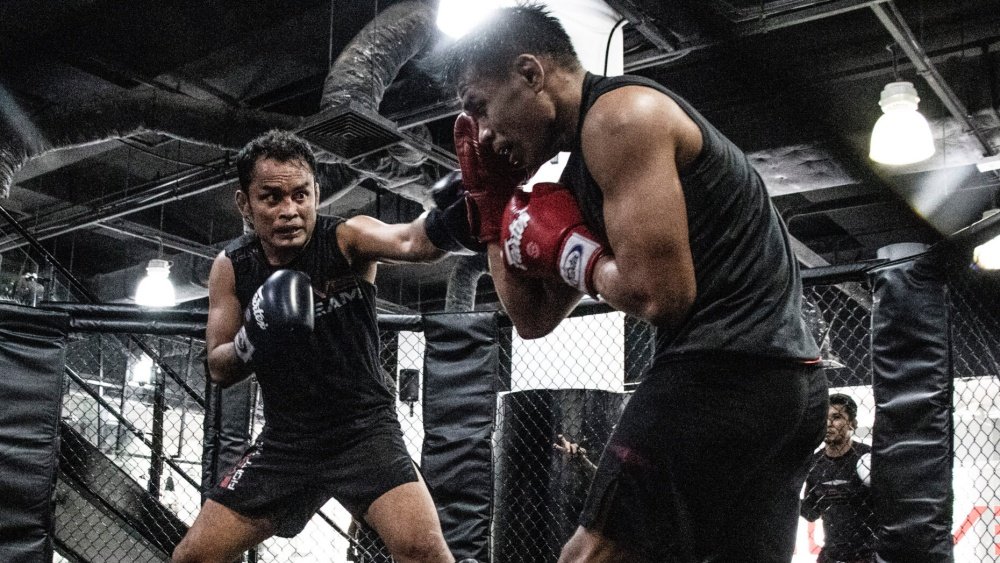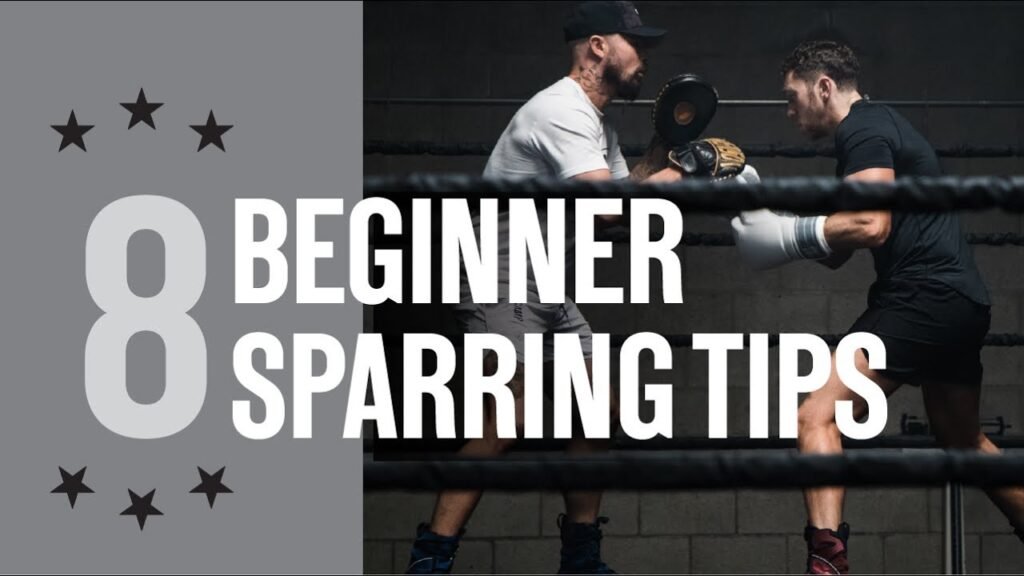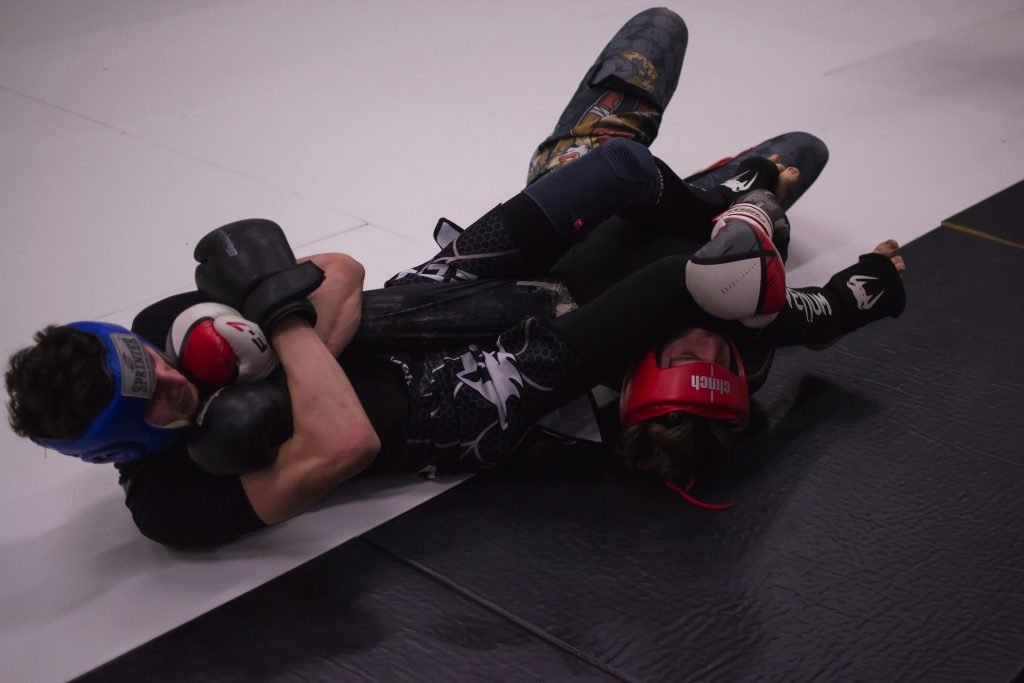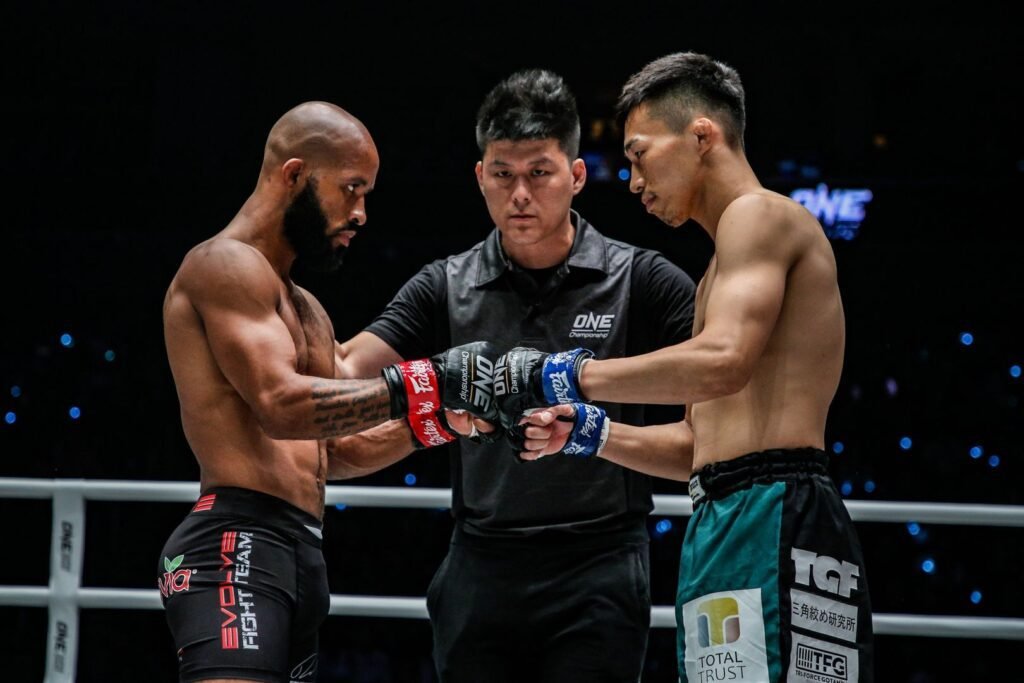So, you’ve decided to take on the fast-paced and exhilarating world of MMA sparring! Whether you’re a newbie stepping into the ring for the first time or someone looking to brush up on their skills, this article is here to help you navigate the exciting but sometimes overwhelming world of MMA sparring. From proper warm-up exercises to finding the right gear, this guide will provide you with essential tips to ensure a safe and successful sparring experience. So tighten those gloves, strap on your mouthguard, and get ready to unleash your inner fighter!
Choosing the Right Gear
Mouthguard
When it comes to engaging in MMA sparring, the safety of your mouth should be a top priority. A mouthguard is an essential piece of gear that protects your teeth, jaw, and overall oral health. It absorbs impact and reduces the risk of dental injuries or concussions. Make sure to choose a mouthguard that fits comfortably and provides adequate protection.
Headgear
Protecting your head is crucial during sparring sessions to minimize the risk of head injuries. Headgear provides cushioning and absorbs impact, reducing the chances of concussions or cuts. Look for headgear that is well-padded and offers a snug fit to keep your head and face properly protected.
Gloves
Gloves are perhaps the most recognizable piece of MMA gear. They offer protection to both the wearer and their sparring partner, reducing the risk of hand injuries. Choose gloves that fit properly and provide adequate padding to cushion the impact of punches and strikes.
Hand wraps
Hand wraps are essential for providing support and stability to your wrists and hands. They help reduce the risk of sprains, fractures, or other hand injuries during sparring. Wrapping your hands properly ensures maximum protection and support, allowing you to train with confidence and minimize any discomfort or pain.
Groin guard
Protecting your groin area is vital in MMA sparring. A groin guard, also known as a cup, offers crucial protection against accidental strikes. It is essential to choose a groin guard that fits securely and provides sufficient coverage to minimize the risk of injury.
Shin guards
Shin guards are particularly important for beginners who are practicing kicks and strikes. They shield your shin and lower leg from potential injuries or bruises. Look for shin guards that are durable, provide good padding, and fit comfortably to ensure maximum protection during training.
Cup
A cup is a necessary piece of gear for male practitioners in order to provide protection to the groin area. It is crucial to choose a cup that fits well and provides adequate coverage to minimize the risk of injury during sparring sessions.
Getting Proper Training
Find a reputable MMA gym
To learn the fundamentals of MMA sparring, it is crucial to find a reputable gym with experienced instructors. Look for a gym that specializes in MMA and has a strong reputation in the martial arts community. Research online, read reviews, and ask for recommendations to find the best gym in your area.
Enroll in beginner MMA classes
If you’re new to MMA sparring, enrolling in beginner classes is a great way to start. These classes are designed to teach you the basics and gradually progress to more advanced techniques. The structured curriculum will ensure that you receive proper guidance and are able to develop solid foundations before moving on to more intense training.
Work with experienced coaches
Having experienced coaches is essential for your growth and development as an MMA sparring practitioner. Coaches will not only teach you the techniques but also provide valuable feedback and corrections to improve your skills. Their knowledge and guidance will help you progress safely and efficiently.
Focus on technique, not just power
When starting MMA sparring, it’s essential to focus on technique rather than trying to overpower your opponent. Being technically proficient will not only reduce the risk of injury but also enhance your overall performance. Mastering basic techniques and understanding the mechanics behind them will lay a strong foundation for your future progression.
Learn and understand the rules of sparring
Each martial art has its own set of rules and regulations for sparring. It is vital to learn and understand these rules to ensure a safe training environment. Familiarize yourself with the specific rules of MMA sparring, including prohibited moves, scoring criteria, and safety guidelines.

Warming Up and Stretching
Begin with light cardio
Before diving into any intense physical activity, it is important to warm up your body. Engaging in light cardio exercises such as jogging or jumping jacks for a few minutes will increase your heart rate and get your blood flowing, preparing your body for the training session ahead.
Dynamic stretching exercises
Dynamic stretching exercises are an essential part of a warm-up routine for MMA sparring. These exercises involve controlled movements that stretch and activate multiple muscle groups simultaneously. Incorporate exercises such as leg swings, arm circles, high knees, and trunk rotations to loosen up your muscles and improve your range of motion.
Joint mobility exercises
Maintaining good joint mobility is crucial for injury prevention in MMA sparring. Include exercises that target the major joints in your body, such as shoulder circles, wrist rotations, and ankle rolls. These exercises will help increase your joint flexibility and prepare your body for the range of movements required during sparring.
Shadow boxing to warm up specific muscles
Shadow boxing is an excellent warm-up exercise that allows you to focus on specific muscles and movements. It helps to activate your core, upper body, and lower body muscles, improving your coordination and rhythm. Spend a few minutes shadow boxing, paying attention to your technique and engaging all the major muscle groups.
Gradually increase intensity
As your warm-up progresses, gradually increase the intensity of your exercises to prepare your body for the demands of MMA sparring. This can be done by increasing the speed, range of motion, or resistance in your exercises. Be mindful of your body’s response and never push yourself too hard, as it can lead to injuries.
Maintaining Proper Technique
Keep your hands up
One of the most important aspects of maintaining proper technique in MMA sparring is keeping your hands up. This protects your face and reduces the chances of getting hit with a punch. By keeping your hands up, you create a barrier and are ready to defend against any incoming strikes.
Protect your chin
Protecting your chin is essential to prevent knockout punches and ensure your safety during sparring. Tuck your chin slightly down and keep it tucked throughout the sparring session. This position provides additional protection to your jaw and prevents your head from being snapped back forcefully.
Maintain a stable stance
Having a stable stance is crucial for maintaining balance and generating power in your strikes. Keep your feet shoulder-width apart, with your knees slightly bent. Distribute your weight evenly and maintain a solid base to withstand any strikes or attempts to destabilize you.
Use proper footwork
Footwork plays a vital role in MMA sparring, allowing you to move around the ring effectively and avoid getting struck. Practice proper footwork techniques, such as pivoting, side steps, and circling, to maintain distance, create angles, and evade your opponent’s attacks.
Focus on defensive techniques
While offense is important in MMA sparring, focusing on defensive techniques can save you from unnecessary hits and potential injuries. Practice blocking, parrying, and slipping punches to evade or minimize the impact of strikes. A balanced approach between offense and defense will make you a more well-rounded sparring practitioner.

Controlling Your Emotions
Stay calm and composed
Sparring can be intense and evoke a range of emotions, but it is crucial to stay calm and composed. Keeping your emotions in check allows you to think clearly and make calculated decisions during sparring. Take deep breaths, stay focused, and avoid getting caught up in the heat of the moment.
Control your breathing
Controlling your breathing is essential for maintaining composure and managing your energy levels during MMA sparring. Practice deep breathing techniques to stay relaxed and oxygenate your muscles. Proper breathing will help you stay focused, reduce fatigue, and maintain control of your movements.
Avoid unnecessary aggression
While sparring can be competitive, it is important to avoid unnecessary aggression. Remember that the goal of sparring is to improve your skills and learn from your partner. Avoid going all-out with aggression and instead focus on technique, control, and respect for your training partner’s safety.
Stay focused on technique
During MMA sparring, it is easy to get caught up in the excitement and lose sight of technique. Stay focused on executing proper techniques, utilizing your training, and implementing what you have learned. Effective technique will always trump raw aggression and increase your chances of success.
Respect your sparring partner
Respecting your sparring partner is of utmost importance. Treat others with respect both inside and outside the ring. Avoid unnecessary strikes or actions that could harm your partner. Remember, the purpose of sparring is to learn and grow together, so always prioritize the safety and well-being of your training partner.
Starting Slow and Controlled
Begin with light sparring
As a beginner, it is crucial to start slow and ease into sparring. Begin with light sparring sessions, focusing on practicing techniques and familiarizing yourself with real-time application. This allows you to learn without overwhelming yourself or your partner.
Focus on technique rather than power
In the early stages of your sparring journey, prioritize technique over power. Concentrate on correct form, timing, and accuracy rather than trying to overpower your opponent. This approach will not only help you master the fundamental techniques but also reduce the risk of injury.
Gradually increase intensity and speed
As you become more comfortable and proficient in your sparring skills, gradually increase the intensity and speed of your sessions. This progression allows you to adapt to faster-paced situations while still maintaining control and accuracy. Remember to always prioritize safety and listen to your body’s limits.
Build trust with your sparring partner
Sparring requires a level of trust between you and your training partner. Building trust allows both of you to push each other’s limits while feeling safe and supported. Communicate openly, give constructive feedback, and respect each other’s boundaries. This trust will create a positive and productive sparring environment.
Communicate and give feedback
Open and effective communication is crucial during sparring sessions. Communicate with your partner about your goals, comfort levels, and any specific areas you’d like to focus on. Giving and receiving feedback is an essential part of improving your skills. Remember to provide constructive feedback respectfully, and be open to receiving feedback to enhance your growth as a sparring practitioner.

Defending Yourself
Learn basic defensive techniques
Understanding and implementing basic defensive techniques is essential for self-defense during MMA sparring. Focus on techniques such as blocks, parries, and slips to minimize the impact of strikes against you. These defensive skills will increase your chances of countering effectively and keeping yourself safe.
Practice blocking, parrying, and slipping
Dedicating time to perfecting blocking, parrying, and slipping techniques is vital for effective defense. Blocking involves using your arms and/or legs to intercept and absorb incoming strikes. Parrying refers to redirecting an opponent’s strikes off your body, while slipping involves moving your head to avoid being hit. Regular practice of these techniques will improve your overall defensive skills.
Don’t rely solely on offense
While offense is important in MMA sparring, relying solely on being aggressive may leave you vulnerable. It is essential to develop a well-rounded defense to protect yourself when engaging with your opponent. By mastering proper defensive techniques, you will be able to absorb and counter your opponent’s attacks more effectively.
Be aware of your surroundings
When sparring, it’s important to be aware of your surroundings at all times. Keep track of the position of the ring or training area, as well as any potential hazards. This awareness will help you avoid collisions, injuries, or being caught off guard during the sparring session.
Listening to Your Body
Take breaks when needed
Listening to your body is crucial for injury prevention and overall well-being. If you feel fatigued or overly sore during a sparring session, take breaks when needed. Pushing yourself beyond your limits can lead to injuries or burnout. Resting when necessary allows your body to recover and perform at its best.
Don’t push yourself too hard
While it’s important to challenge yourself during training, it’s equally important not to push yourself too hard. Pushing beyond your limits without proper rest and recovery can lead to physical and mental exhaustion. Pay attention to your body’s signals and give yourself the necessary time to recuperate and recharge.
Pay attention to any pain or discomfort
Pain or discomfort during sparring should not be ignored. If you experience any unusual pain or discomfort, stop and assess the situation. Pushing through pain can worsen injuries or lead to long-term damage. Consult a medical professional if pain persists or if you have concerns about any lingering discomfort.
Consult a medical professional if necessary
If in doubt regarding any pain or injury, it is always advisable to consult a medical professional. They have the expertise to diagnose and provide appropriate treatment for any potential injuries. Ignoring or downplaying injuries can hinder your progress and jeopardize your overall health.
Focus on rest and recovery
Rest and recovery are just as important as training itself. Give your body sufficient time to rest and recover between sparring sessions. This allows your muscles to repair, rebuild, and become stronger. Adequate sleep, proper nutrition, and relaxation techniques can aid in your overall rest and recovery process.

Developing Strategy and Game Plan
Analyzing your opponent’s strengths and weaknesses
Developing a strategy starts with analyzing your opponent’s strengths and weaknesses. Pay close attention to their fighting style, techniques, tendencies, and previous performances. Understanding their strengths allows you to find ways to neutralize them, while identifying their weaknesses provides opportunities for you to exploit.
Identifying your own strengths
Knowing your own strengths is essential for developing a game plan. Identify the techniques, skills, or attributes that give you an advantage. This self-awareness allows you to capitalize on your strengths and create opportunities for success during sparring sessions.
Creating a game plan
Based on the analysis of your opponent’s strengths and weaknesses, as well as your own, create a game plan that maximizes your chances of success. Determine the techniques or combinations you will focus on, as well as defensive strategies to counter any potential threats. A well-thought-out game plan gives you a clear direction and improves your chances of achieving your goals.
Executing the plan during sparring
Once you have developed a game plan, it’s time to execute it during sparring sessions. Focus on implementing the techniques and strategies you have practiced. Stay disciplined and stick to your plan, making real-time adjustments as needed. Remember that flexibility and adaptability are key when executing a game plan, as your opponent may present unexpected challenges.
Reflecting and adjusting after each session
After each sparring session, take the time to reflect on your performance and adjust your game plan accordingly. Analyze what worked well and what needs improvement. Seek feedback from your coaches and training partners to gain different perspectives. By continuously reflecting and adjusting, you will refine your strategy and improve your overall sparring skills.
Building Confidence and Overcoming Fear
Start with controlled situations
Building confidence begins with starting in controlled situations. Gradually expose yourself to different scenarios while maintaining a sense of control. By starting with well-defined and structured drills, you can gain confidence in your abilities and gradually progress to more challenging situations.
Gradually expose yourself to more challenging scenarios
As you become more comfortable and confident, gradually expose yourself to more challenging sparring scenarios. This could include sparring with higher-level opponents or mixing up different aspects of MMA, such as ground fighting or striking. Gradual exposure to increased challenges helps build confidence and prepares you for different situations.
Believe in your training and skills
Building confidence requires belief in your training and skills. Recognize the effort and hard work you have put into your training and trust in your abilities. Remind yourself of your accomplishments and the progress you have made. Believing in yourself is essential for maintaining a positive mindset and performing to your full potential.
Visualize success
Visualization is a powerful tool for building confidence and overcoming fear. Take time before sparring sessions to visualize yourself executing techniques with precision, evading strikes with ease, and achieving success. This mental rehearsal primes your mind and increases your confidence, making it easier to execute during actual sparring.
Seek support from coaches and training partners
A strong support system is vital for building confidence in MMA sparring. Surround yourself with coaches and training partners who provide encouragement, constructive feedback, and support. Their belief in your abilities can help boost your confidence and provide the motivation needed to overcome any fears or doubts you may have.
Remember, MMA sparring is a continuous learning process. By following these essential tips, choosing the right gear, seeking proper training, warming up effectively, maintaining proper technique, controlling your emotions, starting slow, defending yourself, listening to your body, developing a game plan, and building confidence, you’ll be well on your way to becoming a skilled and confident MMA sparring practitioner. Embrace the journey, stay dedicated, and enjoy the incredible benefits that MMA sparring can offer.

